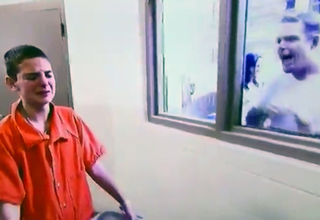Real Men Don’t Cry
I didn’t cry when my son was born. He did, but I didn’t. It was a shrill sound, more a broken toy than a human. Me, I was too stunned to cry. Later, as his mother recovered in the ward, I looked down at this tiny, helpless form. I didn’t know how I’d cope, what I’d do, if this new future could possibly work. After months of waiting, his arrival came suddenly, a summer shower. Standing there, I felt a strange emptiness. ‘What now?’ I remember thinking, and the size of the question frightened me.
Our car, abandoned outside of the hospital in the rush of emergency, needed moving. My son slept in a tiny crib, dressed in white, and we both were helpless.
It was only then that I cried.
These tears marked a profound shift. I had transformed; not a change of actor playing the same character but the same person playing a different role. From the day my son was born, I became a tearful father, ready to well up at the drop of a hat — literally — if someone, especially a child, dropped their little hat, I’d break down. What if they lost it? What if their tiny head became cold? Writing this, my eyes are watering. Because I cry at anything and everything.
Initially, I was ashamed of the change. It was as if a werewolf had bitten me. Instead of growing hairy at the full moon, I’d grow tearful at a beautiful night sky. Imagine if someone saw. My wife or, worse, another man? I was warned that parenthood would change me, but I thought that meant no longer having fun in all-night dance parties — that sort of thing. Crying wasn’t what real men did. Real men like astronauts, like the type described in Tom Wolfe’s 1979 The Right Stuff.
The book contains a chapter called ‘The Tears’. At its conclusion, John Glenn is introduced to JFK’s wheelchair-bound father, Joe Kennedy. The President’s dad cries, proving that parents don’t only well up over their kids. Wolfe is sure to add a qualification: ‘Obviously if the man hadn’t had a stroke, he wouldn’t have burst out crying.’ Obviously. He continues by describing Glenn as ‘the sort of mortal who brought tears to other men’s eyes’. These tears, ‘running like a river all over America’, were ‘an extraordinary thing’.
In a book full of alpha men, this marked the only acceptable instance of crying. John Glenn, I’m sure, wouldn’t have been impressed to learn that I sobbed at the end of Toy Story 3.
But, Senator Glenn, there’s science happening here. I’d like to think bringing a new life into the world forced a more empathetic attitude but, instead, studies have suggested that a father’s brain is rewired. Research published by the National Academy of Science shows how two distinct neurological systems are activated when caring for offspring, in both the mother and the father. Both are related to emotional and social understanding, the mother’s brain looking remarkably like the father’s when dealing with kids. And that’s not all: a Princeton study showed a changing hormonal balance for those men in contact with partners and offspring — oestrogen, oxytocin, prolactin and glucocorticoids all increase, creating a hormonal soup similar to the one a mother possesses. Oxytocin, in particular, is interesting — it’s known as the ‘cuddle hormone’, cuddling being another element of everyday life that increases after you have kids.
Yet this emotional upgrade remained in conflict with my societal conditioning, a short drive, surely, to mental health issues further along the road. Recently, and despite my renovated head, I did a terrible thing. My five-year-old son was running down our street. He tripped, he fell, he grazed his knee. It’s what kids do. When he cried, also what kids do, I lost my patience. I was worried about my wife’s reaction to the blood. I was stressed about work. And, to be honest, his knee didn’t look that bad.
‘Why are you crying?’ I asked him, looking down from the heights of masculinity. ‘Be a man.’
I’d say that as the words left my mouth, I heard my father. But even Dad, a living relict of the twentieth-century, had never said anything like it, despite the occasional raised eyebrow when teenage me chose reading over playing sport. I think my reaction had something to do with the location. Exposed in the street, I didn’t want my neighbours suspecting I was anything less than a great father. And what do dads do? They teach their sons how to be men. Real men. If he’d taken a tumble inside, hidden, I may have cried alongside him. Maybe I wasn’t quite yet the sensitive, empathetic new Tom. I have a vegan friend who hates herself for salivating at the sight of meat. Like her, I felt betrayed by something I didn’t understand. A vestigial part of an early self, fine with a sobbing dad, but less sure about encouraging the next generation.
Like me, football, a traditionally masculine game, suffers conflicting attitudes to crying. In the 2018 World Cup, the Uruguay defender Jose Gimenez, described by The Sun as ‘no nonsense’ burst into tears during play, a full five minutes before the game ended. Although the media were quick to note that there’s nothing wrong with men crying, such an ostentatious act before the match was over drew the wrath of a few pundits. Gary Neville, the ex-Man Utd player and respected commentator, described the Uruguayan’s action as ‘embarrassing’. These weren’t the only tears. French players cried after they’d won the competition. But, according to Man Rules, that’s acceptable. What with them being both European and champions.
Why are tears embarrassing? Why did I feel shame before becoming a father? In Crying: The Natural and Cultural History of Tears, Tom Lutz suggests: “You don’t want emotions interfering with the smooth running of things.” A study at Tilburg University found that men cry between six and seventeen times a year, whereas women cry between thirty and sixty-four times. Would it be a crass to suggest that a more liberal attitude to male tears might help with the mental health issues that result in the often repeated, still unchanged, statistic that, unintentional injuries aside, suicide is the biggest killer of men aged 10–34?
At the end of the last school year, my son won a trophy for his soccer skills. We have it displayed on our bookshelf, next to a knitted whale and an invitation to a fancy party. My wife was present when he was awarded the silverware. The children sat in a circle around the coach, a very serious young woman. When our son’s name was called out, he hesitated. ‘Really?’ His teammates clapped and he stood up. My wife admitted to crying. Later, she was telling me all this, my first reaction was surprise — surely not? You cried? As I was about to ask her whether she really felt it necessary to cry, my conflicted mind turned. My eyes began to spike with tears. I was cast back to that moment in the hospital room. This was the answer to ‘what now?’
My tears started her off again. We stood there crying. We cuddled; we smiled. The transformation was complete. That day, I think, I learnt not to be ashamed. Not of me, not of my son. That day, I knew I’d never again tell him that men didn’t cry. I couldn’t — he came down from his bedroom (sleeping definitely isn’t for children) and interrupted the happy weeping, tears brushed quickly from our cheeks.
‘You two are weird,’ he said.
Whatever the neurological, hormonal, or emotional basis for my newfound tears, I’m pleased they’ve come. I’m Tom Mark 2 — my new skill: crying. I may not be a better person. I need to exercise more. I could give more money to charity. And maybe I could call my parents a little more often. But here’s the one thing I have learned: crying can make you happier. If only I’d paid more attention to all those Romantic poets I studied at university — we are undeniably emotional beings. Us. Men. And tears, like Wordsworth’s definition of “good poetry”, are “the spontaneous overflow of powerful feeling.” To deny this is to live a muted life, an existence in monochrome.






0 Comments